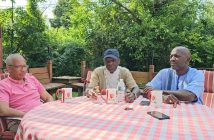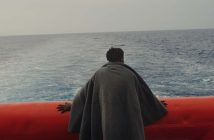translated by Céline Dewaele
Only birds can be heard. A child in a school uniform runs alongside a river and crosses a bridge. Footsteps on a metal bridge. Angle on legs running. Peaceful stop at midway. A young girl looks out a window at an empty courtyard. The teacher writes the date on the board: 13th of July, 1992. And the topic of the essay: « Why do I like my country? ». Slow panoramic shot across the classroom for the camera to settle once again on the young girl who is still looking out the window. Young Ezra arrives in the courtyard. And suddenly, all hell breaks loose, caught on a hand-held camera and by a dynamic cutting: soldiers turn up out of nowhere, kidnapping the children.
Thus begins Newton Aduaka’s new film, magnificiently: both mastering a subtle narration sprinkled with meaningful flashbacks, and an efficient writing which draws from the code of action films. The spectator is under strain and that strain won’t ever leave him again, punctuated with crystal-clear beats coming from a metal percussion in the sound-track, as a counterpoint to the heartbeats. This stress is not solely stirred up by the scenes on warrior paroxysm, always at night, where the twilight and the colours stylize the representation of violence so as not to make it into a painting of death, where the confusion in the editing reflects the confusion on the ground, in the minds and in the hearts. There is no fascination in those scenes, which dwell longer on the escaping and the trauma than on the murders.
Unlike Blood Diamond which deals with the same issues (child-soldiers and diamond trafficking), Ezra is not boom-boom cinema where the ceaseless slaughtering of civilians and undistinguishable soldiers is trivialized. Ezra is too much of an ambivalent character for the spectator to identify himself to: the stress does not come from whether or not the protagonists will survive amid the chaos (besides, in hollywood films, they always miraculously manage to get through it) but from a real reflection which stems from a narrative process where time plays a main role.
Indeed, up to the very end, Newton Aduaka’s film juggles with the notion of memory and it is above all from its reconstruction that arises the tension. Setting it in the middle of the Sierra-Leonean conflict, he invents a « Truth and Reconciliation » Commission, which tries to get Ezra’s account and the acknowledgment of his crimes. The ten-year-old boy who went to school got caught in a system of indoctrination and drugs which would lead him to become a fighter without qualms, capable of anything, including killing his parents and blowing up their house. This is what interested Aduaka, child of the war of Biafra. And thus interested the commission, and the audience who is led to follow snatches of his account, glued together like pieces of a life-puzzle which even Ezra cannot decipher properly. His amnesia as regards to his crimes is sincere: his trauma is dominant, brought out by his nightmares and the psychiatric treatment he received. It is then not with words that Ezra opens up but with his memory, where the forgotten parts concern the suffering he inflicted on others more than the suffering he dealt with himself.
Unlike Daratt from Chad film director Mahamat Saleh Haroun, which aims at recovering its free will by inventing its own fiction, or Zulu Love Letter by south-african film-maker Ramadan Suleman which shows that political discourse for reconciliation is ineffective if it does not come with a mourning process in the private sphere, Ezra does not offer answers to break the vicious circle of vengeance and « Blood brotherhood ». Ezra’s amnesia, because of which he cannot admit to his crimes, torpedoes the « healing » process sought by the president of a commission who is convinced that the Word is a factor of peace. Reality resists: nor Ezra, nor his sister whose voice was ravished, nor the nun who only remembers the « blood and the screaming », can describe it in words. The film will achieve it through fiction.
Maybe because saying it is not enough. Ezra’s appeal for forgiveness, that the film passes on through a voice-over, remains eminently political: it is not to understand human perversity but how the system of violence leads humans astray. Rufus, the rebel’s chief, helped by his exterminating right-hand man, Terminator, endocrinates so as to better exploit and lines his pockets with diamonds. That’s when Erza understands that he can desert. No-one forgives his crimes but all understand the spiral he was caught in and the trauma he suffered. Allah is not obliged to always be fair, suggests Ahmadou Kourouma: fate is often quite cruel. Ezra does not believe in presents from the black Santa Claus. His only hope is to build himself a future. But on the level of society, allowing victims and torturers to coexist implies for the page not to be turned.That is what the film does: it does not suggest forgetting but defining the issues: weapons are still finding their way into Africa and blood diamonds, oil and natural resources are still being plundered. So the film acts as a testimony while raising the question of North/South relations, never expressing anything didactically. Corrupted Whites are simply there, and supply weapons and amphetamines in exchange for diamonds.
Gladly conforming to romance (Ezra’s relationship with Mariam a.k.a Black diamond) and never scared of leading the spectator where he chooses, Newton Aduaka cleverly measures out the ingredients for a classical fiction and an unintelligible narration: the flashbacks on the hearings of the Commission structure the film according to the pattern of the very frequent trials in american cinema. But the absence of linearity and the games played by the amnesia transcend them so as to make the spectator active, he who is also looking to fathom the character’s complexity. By achieving this alchemy, Aduaka makes a film for the general public, which will also stir people into action, an essential contribution to learning how to achieve peace.
///Article N° : 5877








